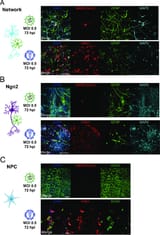Anonymous
ID: TvPlWjIg
7/23/2025, 7:37:51 AM No.511112789
https://www.nature.com/articles/d41586-025-02313-3
Using brain scans from a very large database, British researchers determined that
>during the pandemic years of 2021 and 2022, people's brains showed signs of aging,
including shrinkage, according to the report published in Nature Communications. People who got infected with the virus also showed deficits in certain cognitive abilities, such as processing speed and mental flexibility.
The aging effect "was most pronounced in males and those from more socioeconomically deprived backgrounds," said the study.
"It highlights that brain health is not shaped solely by illness, but also by broader life experiences."
Overall, the researchers found a 5.5-month acceleration in aging associated with the pandemic. On average, the difference in brain aging between men and women was small, about 2.5 months.
"We don't yet know exactly why, but this fits with other research suggesting that men may be more affected by certain types of stress or health challenges," he said.
The study wasn't designed to pinpoint specific causes. "But it is likely that the cumulative experience of the pandemic -- including psychological stress, social isolation, disruptions in daily life, reduced activity and wellness -- contributed to the observed changes," he said.
"In this sense, the pandemic period itself appears to have left a mark on our brains, even in the absence of infection."
"The most intriguing finding in this study is that only those who were infected with SARS-CoV-2 showed any cognitive deficits, despite structural aging," said Jacqueline Becker.
"This speaks a little to the effects of the virus itself."
The study may shed light on conditions like long Covid and chronic fatigue, though it's still unclear whether the observed brain changes in uninfected individuals will lead to noticeable effects on brain function.
Using brain scans from a very large database, British researchers determined that
>during the pandemic years of 2021 and 2022, people's brains showed signs of aging,
including shrinkage, according to the report published in Nature Communications. People who got infected with the virus also showed deficits in certain cognitive abilities, such as processing speed and mental flexibility.
The aging effect "was most pronounced in males and those from more socioeconomically deprived backgrounds," said the study.
"It highlights that brain health is not shaped solely by illness, but also by broader life experiences."
Overall, the researchers found a 5.5-month acceleration in aging associated with the pandemic. On average, the difference in brain aging between men and women was small, about 2.5 months.
"We don't yet know exactly why, but this fits with other research suggesting that men may be more affected by certain types of stress or health challenges," he said.
The study wasn't designed to pinpoint specific causes. "But it is likely that the cumulative experience of the pandemic -- including psychological stress, social isolation, disruptions in daily life, reduced activity and wellness -- contributed to the observed changes," he said.
"In this sense, the pandemic period itself appears to have left a mark on our brains, even in the absence of infection."
"The most intriguing finding in this study is that only those who were infected with SARS-CoV-2 showed any cognitive deficits, despite structural aging," said Jacqueline Becker.
"This speaks a little to the effects of the virus itself."
The study may shed light on conditions like long Covid and chronic fatigue, though it's still unclear whether the observed brain changes in uninfected individuals will lead to noticeable effects on brain function.
Replies:






